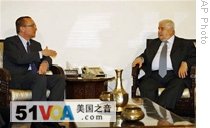Cairo
07 March 2009
 |
| U.S. Assistant Secretary of State Jeffrey Feltman (l) meets with Syrian Foreign Minister Walid al-Moallem in Damascus, Syria, 07 Mar 2009 |
Two senior U.S. diplomats have met with Syrian Foreign Minister Walid al Muallem in Damascus, Saturday, in the first high-level visit by ranking U.S. diplomats since January 2005.
Acting Assistant Secretary of State Jeffrey Feltman and National Security Council member Dan Shapiro met with Syrian Foreign Minister Walid Muallem in Damascus, Saturday, amid attempts to broker a rapprochement between the United States and Syria after years of tumultuous relations between the two countries.
Feltman told U.S. journalists in a conference call that Syria is in a position to play "an important and contructive role" in the Middle East. "We found a lot of common ground today," he emphasized.
Deputy Secretary of State Richard Armitage was the last senior U.S. diplomat to visit Damascus, in January of 2005. Washington withdrew Ambassador Margaret Scobie the following February in the wake of the assassination of former Lebanese prime minister Rafiq al Hariri.
Many top Lebanese leaders accused Damascus of the killing, and a subsequent U.N. investigation turned up several links to Syria, although no accusations were made. Syria has steadfastly denied involvement in assassination.
Feltman, a former U.S. ambassador to Lebanon, visited Beirut, Friday, meeting with top Lebanese officials, in an apparent bid to reassure them that the United States has no intention of improving ties with Damascus at the expense of its smaller neighbor.
Feltman told reporters in Beirut that the United States had a "long list" of issues to discuss with Syrian officials.
U.S. Secretary of State Hillary Clinton, who met briefly with the Syrian foreign minister at last week's Egyptian-sponsored conference to raise foreign aid money to help rebuild the war-torn Gaza Strip, said Friday that the Obama administration was "testing the waters" in its diplomatic contacts with both Syria and Iran.
Last month, several top delegations of U.S. lawmakers, including Senate Foreign Relations Committee Chairman John Kerry visited Damascus, but Kerry pointedly insisted that he was "not representing the Obama administration."
Feltman indicated that Saturday's talks were built on his meeting ten days ago with Syria's ambassador to Washington, Imad Mustapha, which he then described as "very frank."
Syrian political analyst Ahmed Haj Aly says that it is important for both sides to discuss "common interests" even if the road to normal relations is long. He says that there are common points of interest that we must pursue, no matter how small, despite all the contradictions prevailing until now with respect to the bigger picture. But, he insists, it is important that (this meeting) constitute a beginning for our common interests from a standpoint of good-will, even if we don't delve into the more sensitive issues. Improving relations between both countries, he adds, is going to be a long road.
Professor Joshua Landis of the University of Oklahoma, who runs the well-known Syria Comment Web site, says that he envisions a resumption of military cooperation between the United States and Syria, soon, as well as talk of sending an ambassador to Damascus.
"There will be talk of an ambassador returning to Syria, shortly, and this lays the groundwork for it. We should also see some military exchanges and the beginnings of intelligence cooperation between the Americans and Syrians, particularly on Iraq border issues, and of course there will also be an attempt to get dialogue going on the Palestinian issue, because Syria can help a great deal with America's Palestinian problem, which is how to get this aid that was raised at Sharm el Sheikh into Gaza," he said.
U.S. President Barack Obama told both Iran and Syria, in a recent press conference, that the United States was willing to open a dialogue if both countries would "unclench their fists."